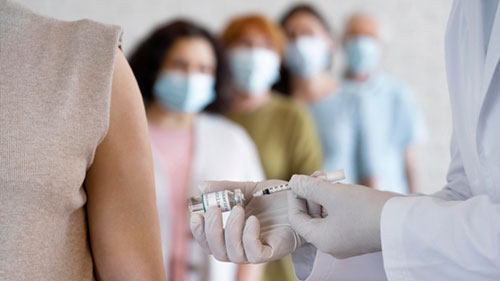We are privileged to live in a constantly progressive and developing world, which is especially advancing in the field of science and technology. Research and development in the area of immunization are working consistently towards bringing us safe vaccines to prevent certain diseases. The word “vaccination” resonated strongly with the adult population during the COVID-19 pandemic. Otherwise, vaccination was a term that was common among parents having young children.

Many are unaware that adult vaccination is routine and sometimes mandatory in certain places. Adult vaccination helps in preventing some common communicable diseases which can lead to significant morbidity and in some cases, it even prevents mortality.
Why Do Adults Require Vaccination?
- To boost the immunity of certain vaccines taken in childhood.
- To prevent diseases for which vaccines were discovered in the recent past.
- For adults who have impaired immunity as a result of a pre-existing health condition such as diabetes, heart disease, chronic lung disorders, chronic kidney disease, etc.
- Travel Vaccination – For preventing diseases specific to a particular geographic region.
- Vaccinations for work-related health risks.
The common vaccinations available for adults are the following:
Influenza Vaccine:
The influenza virus has been responsible for a number of pandemics prior to COVID-19. The virus undergoes mutation in the form of antigenic shift and antigenic drift. A new strain of the virus is seen every year. Hence, to prevent influenza-related complications, it is advisable for all adults to be vaccinated annually. It is recommended in India for all above the age of 50 years. Two types are available – Northern and Southern Hemisphere vaccines and are released at different times of a year. The ideal time of vaccination for residents in Tamil Nadu and most parts of South India will be between September to October ahead of the “flu season”.
There is also a live attenuated vaccine available in the form of a nasal spray which is not recommended for immunocompromised individuals.
(In India, for the current year, WHO recommended either Northern Hemisphere (NH) or the Southern Hemisphere (SH) vaccine since the circulating strains of Influenza match the NH 2022, 2023 and SH 2022 vaccine composition.)
Hepatitis B Vaccine:
This is an important vaccine in professions that come in contact with blood, blood-related products and body fluids. It is mandatory for healthcare professionals and public safety workers. It is recommended for certain groups with high-risk behavior such as intra-venous drug abusers, sex workers, people with multiple sexual partners and also partners of patients with chronic hepatitis B. In previously vaccinated, the anti-HBs antibody titre can be tested and if the titre is less than 10, a booster dose is required. In unvaccinated individuals, 3 doses are recommended at 0-, 1- and 6-month intervals.
Human Papilloma Virus Vaccine:
Vaccination (quadrivalent) against the human papilloma virus protects against serotypes HPV 6, 11, 16 and 18. Of these serotypes, 16 and 18 are responsible for most HPV-related carcinoma of the cervix. It is recommended for all females between the age group of 16-26 years. It can be taken as early as >9 years of age.
For girls between the age of 9-14 years, 2 doses are recommended at 0 and 6 months.
Women between the ages of 15 – 26 years 3 doses at 0, 1 and 6 months.
Women between the ages of 27- 45 years 3 doses at 0, 1, and 6 months or 0, 2 and 6 months.
The vaccine is approved for use in males between the age group of 9 to 26 years of age in certain countries. It is used to prevent genital warts and plays an important role in preventing certain types of penile carcinoma caused by HPV.
Tetanus, Diphtheria and Pertussis Vaccine:
This vaccine should be offered to any adult who requires a tetanus toxoid vaccination if not previously vaccinated with DPT in the last 10 years. Two types are available:
DTaP (acellular pertussis)
DTwP (whole cell pertussis)
It is recommended once every 10 years till the age of 65 years. For previously unvaccinated adults, Td (tetanus and diphtheria) 3 doses at 0, 4 weeks and then 6-12 months intervals. One out of the 3 doses should be substituted with DTaP.
Pneumococcal Vaccine:
Streptococcus pneumoniae is a capsulated, gram-positive bacteria which is responsible for causing certain types of pneumonia, meningitis and sepsis. The two types of pneumococcal vaccine are conjugate (PCV13) and polysaccharide vaccine (PPSV23). In previously immunized, immunocompetent adults, one dose of PPSV23 is recommended. In previously unvaccinated, PCV13 followed by PPSV23 after a duration of 8 weeks minimum is required. Revaccination with PPSV23 is recommended after 5-year duration and/or after the age of 65 years. This vaccine is strongly recommended in immunocompromised individuals especially those with chronic lung diseases. PCV-15 and PCV-10 are newer available pneumococcal conjugate vaccines.
Shingles Vaccine:
Shingles or Herpes Zoster is caused by the Varicella zoster virus. In most cases, this is usually a self-limiting condition. However post-herpetic neuralgia (PHN) associated with this condition can last for a long time. The pain is sometimes recurrent and refractory to many drugs. Two vaccines are available to prevent this disease – Live attenuated Zoster vaccine, which is taken as a single dose and Recombinant vaccine which is taken as 2 doses at 0 and 2 months. It is recommended for all above the age of 50 years. Live attenuated Zoster vaccine cannot be used in immunocompromised individuals.
In conclusion, it is important to know the adult vaccines recommended in our country since immunization is a proven and cost-effective way of dealing with the increased rate and spread of communicable diseases. Effective vaccination programs have helped eradicate a few diseases in the past. Vaccinating ourselves helps prevent and also protects the family and community against a wide spectrum of communicable diseases.

